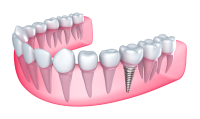Treatment With Dental Implants
One of the most interesting questions concerns the various situations that can be treated with dental implants that are available to the patient.
Factors to Consider for Dental Implants
As you may imagine, various factors must be considered for each individual. These will include the length of time teeth have been missing, the intended location of the dental implant, the amount of bone that remains, the quality of bone, the overall health of the patient, and the preference of the patient.
The longer the teeth are missing, the less bone will be available to receive the intended dental implant. Bone loss in such situations is a normal process where the body actually will resorb and remodel the remaining bone where teeth have been removed. If the patient wears a removable partial or a full denture, then the loss of bone is greatly increased. This results in that awful “denture look”.
The location of the dental implant is another important consideration – whether upper or lower jaw and the front or the back of the jaw. The bone in the lower jaw is more dense than the bone in the upper jaw. This is normal.
Special Considerations on Dental Implant Jawbone Sites
In the upper jaw, the location of the upper sinus on each side of the jaw must be considered. If the sinus is in the desired location of the dental implant, then a procedure can be performed to add bone to the area before the implant is placed.
In the lower jaw, the location of the nerve that provides feeling to the lips and chin must be considered and avoided. Virtually always, that is not a problem and does not prevent the placement of the dental implants.
The amount of bone available depends on the factors discussed above. As bone is lost, the bone will be reduced both in height and in width which determines Dr. Entrekin’s choice of dental implants. The bone in either jaw can become thin in width and less in height. Therefore, various sizes of dental implants (length and width) are available.
Usually, bone quality is not a real factor unless the patient has been taking the common prescription medications that are used to (hopefully) prevent osteoporosis.
These drugs can be a serious detriment to good bone quality and should not be used, at least for the long term.
Implant Patient’s Overall Health is a Factor

overall good health for dental implant procedures
The overall health of the patient is a major factor to consider with the placement of dental implants. Any serious medical, or dental, issues must be treated. Generally speaking, most chronic (ongoing) medical issues that are well controlled do not prevent the use of dental implants. Dr. Entrekin will carefully evaluate all issues that may be present, and make recommendations accordingly.
This will also include a thorough oral examination to eliminate any potential problems, and instructions in good home care for the mouth.
Implant Patient Preference Should Be Considered
Once you have decided to have dental implants placed, then you may have the opportunity to choose either fixed or removable teeth to be supported by your dental implants. Fixed teeth are permanently cemented onto the implants and cannot be removed. Removable teeth are also supported by the dental implants and can be removed by the patient for cleaning. Once in the mouth, they also are solidly stable and function much like permanent teeth. The number of missing teeth will be considered before any decision is made.
The situation and desire of each individual patient will also help determine which is best.
Both fixed or removable teeth that are supported by dental implants offer the confidence, eating ability, and beautiful smile of natural teeth.
These are only some of the factors that are to be considered when choosing dental implants. Others are usually minor. Once these issues are cleared, then you can be on your way to excellent dental health!

